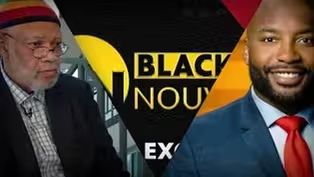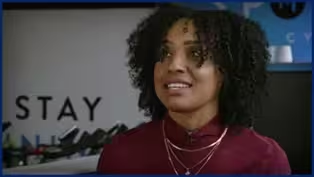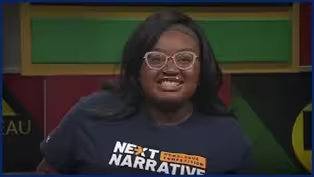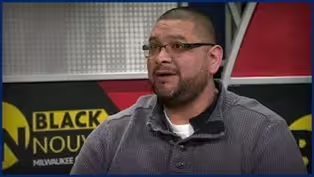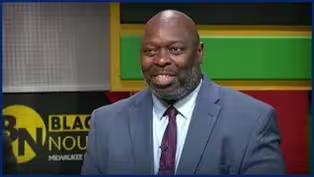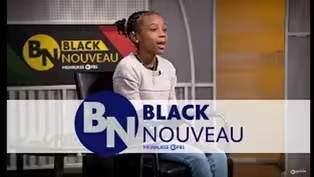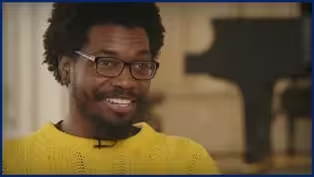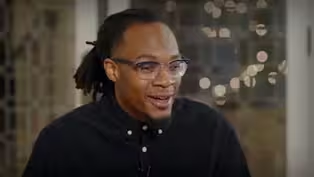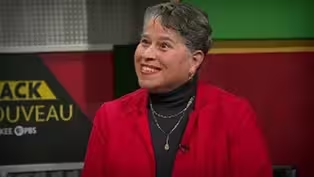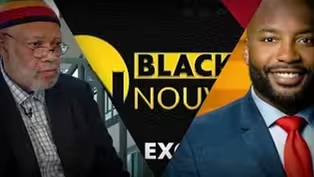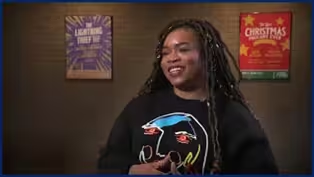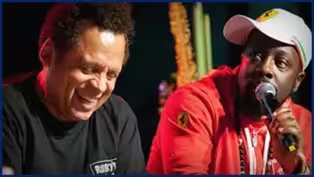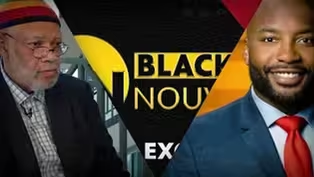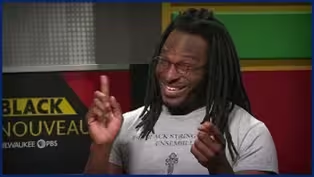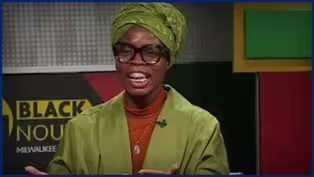Black Nouveau
The importance of organ donation
Clip: Season 32 | 7m 47sVideo has Closed Captions
The importance of organ donation
The importance of organ donation
Problems playing video? | Closed Captioning Feedback
Problems playing video? | Closed Captioning Feedback
Black Nouveau is a local public television program presented by MILWAUKEE PBS
This program is made possible in part by the following sponsors: Johnson Controls.
Black Nouveau
The importance of organ donation
Clip: Season 32 | 7m 47sVideo has Closed Captions
The importance of organ donation
Problems playing video? | Closed Captioning Feedback
How to Watch Black Nouveau
Black Nouveau is available to stream on pbs.org and the free PBS App, available on iPhone, Apple TV, Android TV, Android smartphones, Amazon Fire TV, Amazon Fire Tablet, Roku, Samsung Smart TV, and Vizio.
Providing Support for PBS.org
Learn Moreabout PBS online sponsorshipin the United States black people are four times as likely to develop kidney failure as white people but they are much less likely to receive a life saving kidney transplant Tyrone Doom is a lifelong public official who has worked with youth much of his career needs to transplant Duma joins us along with neologist Dr Lisa Rich thanks for joining us on this critical issue so I want to start with you uh Tyrone um how how long have you been on a kidney donation list and um can you tell me what you needed to do to qualify for this list actually it started last year I got on dialysis in November 23 I'm sorry 22 and then it took about and then my friend judge Mosley said you ought to go ahead and try to get on a a list and he suggested freighted so I started in their process in November of 22 and in a year I had multiple tests for lots of things and now I'm also getting on the list of W Madison so it's been about a year of uh many tests and processes to make sure my body not only could uh handle it and that I was Fit For A transplant Dr Rich why are African-Americans more prone for kidney failure and um what could be done to address this well it's a great question um and something we struggle with on a daily basis so the causes of kidney fail in this country are primarily diabetes and high blood pressure about 2third of the patients have diabetes and about half have high blood pressure because many have both um the incidence of both diabetes and high blood pressure is higher in the African-American population and I think one of the more significant issues is lack of access to health care so when patients don't treat the diabetes adequately when the blood pressure is not well controlled then the kidney function goes downhill so that's why there's more kidney failure um but it doesn't wholly address the question of why the rate of transplantation is lower um there's a lot of issues that are involved in that one is skepticism in the African-American population where there's a very low donation rate um if we look look at for example W Madison versus freder um W Madison did about 300 transplants last year um and freder did about 100 um eight of that 100 were living donors whereas in Madison 100 of the 300 were living donors and so um patients who are on the list in the areas that freered and Aurora's transplant program feed into the counties sort of surrounding Milwaukee which have a higher population of African-American patients and population has a very low rate of living donation so those patients are waiting like four and five years to get a transplant whereas someone who goes to W Madison is only waiting like a year and a half um overall there's like 1,200 people waiting for a transplant and as I was saying it's like a hundred were done at freder another 50 at St Luke's but and then 300 in Madison so you can see we're not meeting the need at all so a a big part of it is people need to sign their donor card and that's another portion I think that is underrepresented in the African-American Community people don't sign their donor card I think there's been a negative stuff in media and like television and stuff where people somehow think if you sign your donor card we're not going to take care of you or we're going to view you as some sort of a an organ donor and not as a patient or that we won't treat you and that's just so not true and you can live with one kidney right absolutely absolutely um so a living donor is the best path for many people to get uh a kidney so t r how has dialysis impacted your life what's the process well I I get it I'm I'm on a Monday Wednesday Friday schedule and I'm in the chair for three and a half hours but you got to count that I got to get there 15 minutes before and also after the uh needles are removed and my blood has to clot and stop and so sometimes I'm really about 4 hours in or more depending on how that day going so now I have to arrange my day around that and then I have to try to make sure that I get some kind of U rest and exercise in because when you finish you're drained I'm drained and it takes me a while to to re rejuvenate my body and rejuvenate my spirit and I think what always makes it good for me is I still have hope and I still have optimism but I can see where you could lose it because you you got to find a way in three and a half to four hours to keep yourself active keep your mind active and not to think negative thoughts and to try to work your way through it and that's 3 days a week and so and now you you're limited to what you can do how you travel all of the things you do and there's multiple ways you can do it you can do it yourself at home you don't have to always go into a center to do it uh I chose to go into a center uh I'm I didn't I'm not doing it at home I think that's called um a certain kind of dialysis paral dialysis so I Ted I decided I would go into the center my three days a week rather than have equipment and supplies in my house and do it myself at home okay Dr Rich real quick um we're running out of time but can you tell me what what are the signs people should look for if there's us that's May suspect that they may have kidney failure that's an excellent question um one of the big barriers to identifying kidney disease is that there's no symptoms until it's very very late literally 90% of your kidney function is gone before you have any symptoms so many times I've had patients saying I don't believe I have kidney disease because my urine looks fine I'm making urine well you can have failing kidneys and still make urine so the signs which are very late are things like as the waist builds up nausea lack of appetite weight loss shortness of breath as fluid weight builds up and um weakness cramps in the muscles twitching muscles all of which are very not specific to kidney disease and many people have kidney failure and never see any change in how much urine what the urine looks like so really we have to identify that with a blood test and urine test you know for microscopic measurements so it sounds like it's important to really follow up with your doctor so important to see your doctor and have those tests done and also the diabetes component making sure you following those regimens and the high blood pressure regimens and the food you eat I learn I had to change my diet I had to meet with the doctor and a nutritionist and say you got to stay away from processed food and many different things that I took for granted thank you thank you I appreciate it you welcome
Video has Closed Captions
Clip: S32 | 6m 22s | Souls To The Polls 2024 (6m 22s)
Recovering from Disordered Eating
Video has Closed Captions
Clip: S32 | 6m 26s | Recovering from Disordered Eating (6m 26s)
Video has Closed Captions
Clip: S32 | 6m | Wisconsin has the highest Black incarceration rate in the country. (6m)
Video has Closed Captions
Clip: S32 | 6m 3s | James Causey speaks with w Black Milwaukee Republican (6m 3s)
MLK Speech Writing Contest Winner Zaida Smith
Video has Closed Captions
Clip: S32 | 6m 32s | The 40th Annual MLK Speech Writing Contest Winner - Zaida Smith (6m 32s)
Video has Closed Captions
Clip: S32 | 6m 40s | Alexandria Mack profiles Mikhail Johnson, a Jamaican composer (6m 40s)
Video has Closed Captions
Clip: S32 | 7m 57s | January 2023 Edition of "Black Nouveau features a profile of Milwaukee native Malik Johnson (7m 57s)
Video has Closed Captions
Clip: S32 | 6m 52s | Former Black Nouveau host Joanne Williams discusses her documentary (6m 52s)
The importance of organ donation
Video has Closed Captions
Clip: S32 | 7m 47s | The importance of organ donation (7m 47s)
Video has Closed Captions
Clip: S32 | 4m 54s | Gospel Rapper Rael The Artist (4m 54s)
Black Diaspora Symphony Orchestra
Video has Closed Captions
Clip: S32 | 6m 29s | Dayvin Hallmon believes that music can both create and heal communities. (6m 29s)
Black Diaspora Symphony Orchestra
Video has Closed Captions
Clip: S32 | 6m 29s | Dayvin Hallmon believes that music can both create and heal communities. (6m 29s)
Video has Closed Captions
Clip: S32 | 7m 26s | In honor of Women’s History Month, BLACK NOUVEAU features a profile on artist Della Wells. (7m 26s)
Providing Support for PBS.org
Learn Moreabout PBS online sponsorshipSupport for PBS provided by:
Black Nouveau is a local public television program presented by MILWAUKEE PBS
This program is made possible in part by the following sponsors: Johnson Controls.
